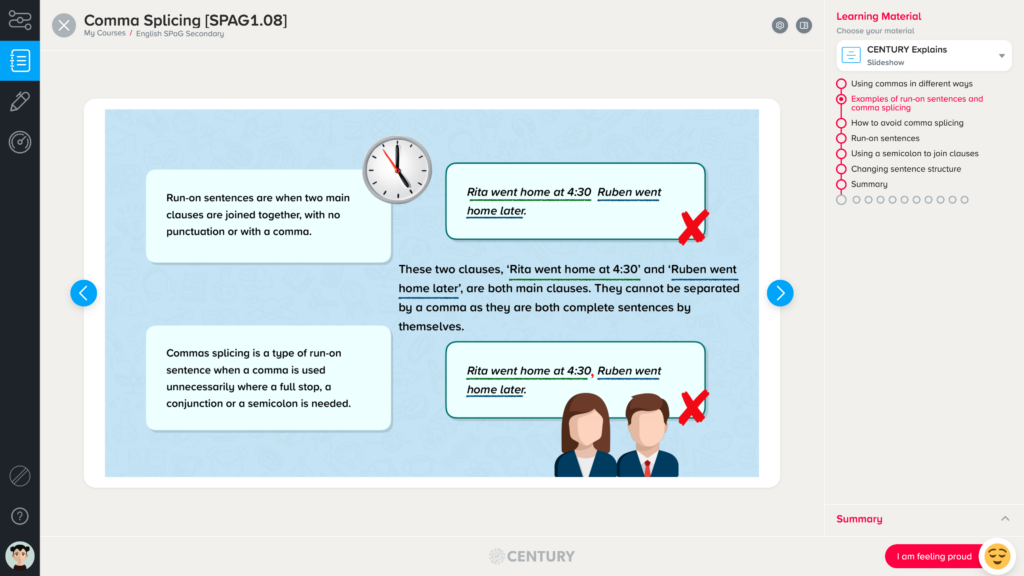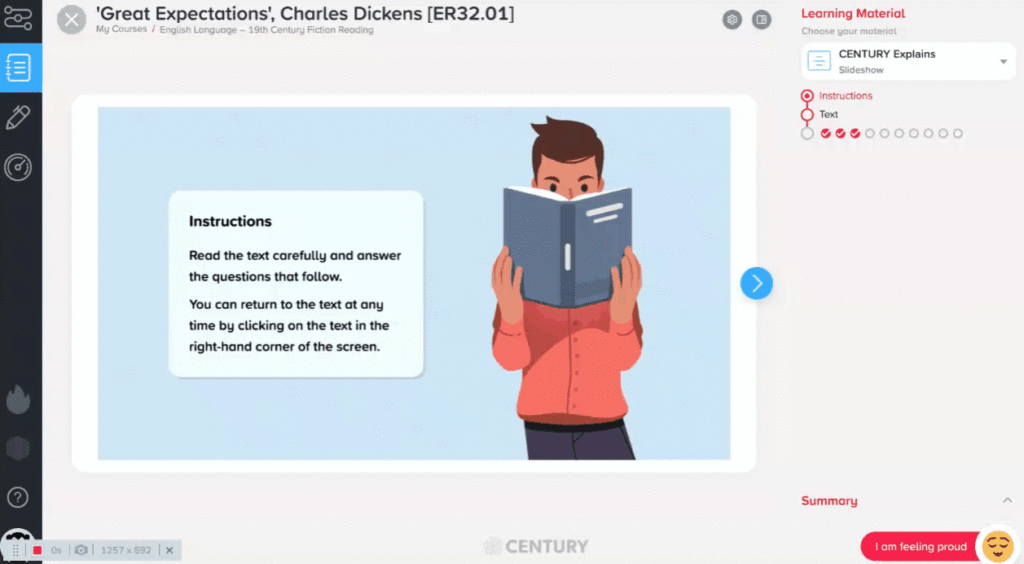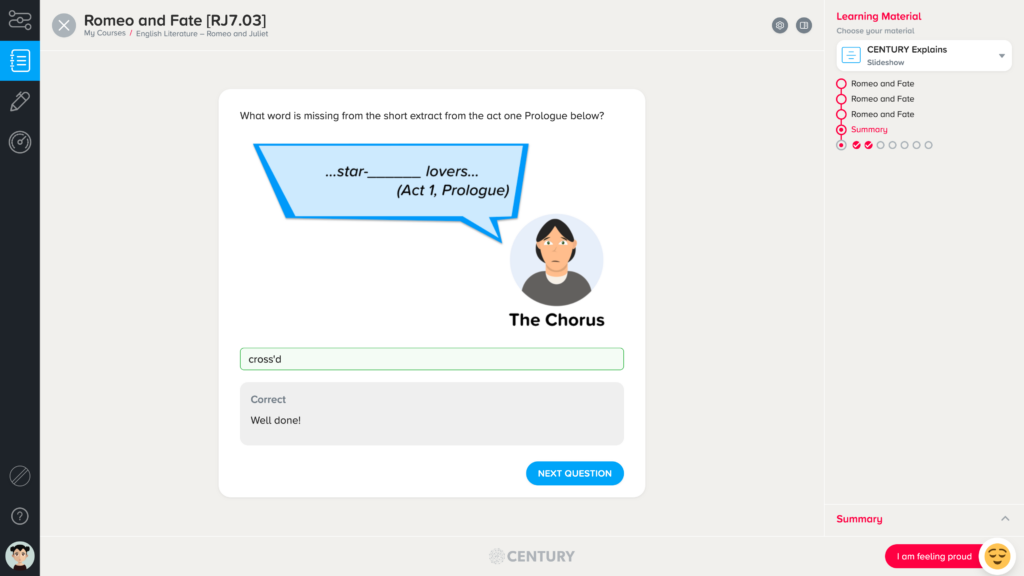How CENTURY can support teaching English
Estimated reading time: 4 minutes
One thing we hear repeatedly from teachers is how hard their pupils find it to hold all the English GCSE content in their heads at once. From all the quotations they must memorise, to the names of each poet in the anthology; from the order of key events in a 200 page novel, to the specific contexts for each text; from which AO is assessed in which question to how they should apportion time to each section of the exam. It is a tall order. It can be challenging to cover and revise these. There can often be a gap of several months, or even years, between studying a part of the GCSE, and then revisiting it for revision, by which time it feels like you may as well teach the text afresh, given how little pupils remember! Here, we outline our courses for language and literature, as well as hearing directly from teachers at our partner schools about how CENTURY supports their teaching and learning.
How CENTURY can help to teach SPaG
Our spelling, punctuation and grammar (SPaG) courses are designed to be used by students independently, with the teacher setting nuggets as appropriate. Once students have completed a diagnostic, they can follow their Recommended Pathway to fill in any gaps. Our secondary course builds on the skills learnt in primary school, whilst the GCSE course is targeted at higher-level GCSE students to cement a deeper understanding of grammar and encourage the use of more sophisticated grammatical structures.
Jonnie Noakes, Director of Teaching and Learning, Eton College
CENTURY is a brilliant solution to teach the tricky area of spelling, punctuation and grammar. It removes the time-wasting process of spending whole-class time on details of SPaG that some of the pupils already understand. It also gives the teacher really useful and comprehensive data on what the pupils know and on their progress in areas they need to improve. For an English teacher, it’s rare to get this sort of detailed data. It also frees up time for focusing on reading and writing tasks in class.
How CENTURY can develop reading skills
One of the hardest things to do as an English teacher is to ensure your students are reading independently in their spare time. It is even harder to hold students accountable for this. Our KS3 reading course exposes students to a wide variety of fiction and non-fiction texts followed by comprehension and analysis questions. You can direct students to complete a nugget a week and track this easily using the Markbook. CENTURY’s reading courses can be used for your KS3 homework.
When trying to prepare learners for the unseen fiction extract question in the GCSE English language paper, it can be really time consuming for teachers to find extracts. These courses help students to develop their comprehension skills, necessary for GCSE. Another advantage of these courses is that learners can be exposed to a variety of themes and language, which will hopefully spark their interest and encourage them to seek out the novel in the library.
Each extract includes a paragraph in italics to help students to understand the context and prepare them for how these extracts will appear in the actual exam. Assessment questions within the nuggets increase in difficulty, starting with vocabulary and comprehension and ending with analysis. We also include examples of analytical paragraphs so learners can be exposed to model answers.
How CENTURY can support studying KS4 Literature texts
CENTURY’s literature courses cover a selection of GCSE texts, focusing on plot, key events, characters, themes, context, language, structure and form. Students can complete relevant CENTURY nuggets to assess learning during the teaching of the text. Alternatively, you can assign the course once you have finished the text in class and CENTURY will recommend relevant nuggets at the appropriate time to ensure content covered earlier in the course stays in the front of students’ minds.
If you study some of our KS4 literature courses at KS3, you can tailor courses to remove irrelevant nuggets. Your dedicated CENTURY account manager can provide you with resources on how to edit courses.
Our unseen poetry course contains a bank of unseen poems commissioned and written exclusively for CENTURY. It teaches the skills students need to analyse and compare unseen poems.It also saves teachers valuable time sourcing unseen poems and provides them with data on how students are performing.
Hayley Wright, Learning Director of English, Kingsthorpe College
My students have found that CENTURY has helped to guide them on how to revise. The AI makes suggestions about which topics need to be revised next. These short nuggets are very specific and help to address topics and skills in more manageable quantities.
For more information about CENTURY’s English resources and to find out how your school or college can benefit from 10% off your first year’s English subscription on CENTURY, click here.
CENTURY in the news
View all News
-
Uncategorised
26th June 2025
CENTURY launches new AI feature to transform personalised homework
We are delighted to announce the launch of our new Smart Assignments feature, designed to save teachers’ time and improve student learning through personalised, adaptive homework that can be set in minutes.
Read more
-
Case studies
23rd June 2025
CENTURY Ambassador Spotlight – Nadine Baki – Dar Al Marefa School
Nadine Baki, a CENTURY Ambassador at Dar Al Marefa School, shares how her school has successfully embedded CENTURY and the benefits it has brought to both teachers and students.
Read more




